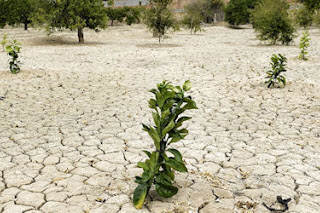Spain: Bacteria helping plants to grow in desertified soils
Scientists from the University of Almería have identified which bacteria, living in the upper millimeters of the soil surface, prevent desertificiation in two semiarid Mediterranean ecosystems.

Biological soil crusts (hereinafter “biocrusts”) are a highly representative dryland community of organisms which live in the upper millimeters of the soil surface, occupying up to 70% of the surface in arid and semiarid areas around the world.
Biocrusts are made up of different types of organisms like mosses, soil lichens, green algae, fungi, cyanobacteria and other bacteria, closely bound to soil particles. These highly specialized organisms can survive and develop under the extreme conditions of arid environments where vascular vegetation cannot thrive. Their role in arid and semiarid ecosystems is essential, affecting soil functionality.
Biocrusts influence the physical and chemical properties of the underlying soil by reducing erosion and improving primary productivity, stability and fertility of soil for plants.
Biocrusts could be indirectly influence the microbial communities in the underlying soil through their effect on chemical soil properties. Nevertheless, the potentially important effect of biocrusts on the diversity and composition of the microbial communities has scarcely been explored.
This research analyses the effect of biocrusts on the bacterial composition and diversity of the soil, comparing two different areas with similar environmental conditions, but in different stages of degradation in a Mediterranean semi-arid ecosystem.
¨With this information, it will be possible to select the bacteria that provide benefits to this type of soil, as well as to develop solutions which contribute to generating and fixing the protective crust¨, Dr. Isabel Miralles, leader of the research group, said.
The full article in English here: https://bit.ly/3iSqall
Source: hortoinfo.es